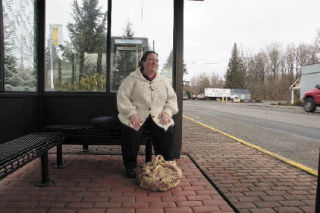Metro Transit officials are looking for solutions to a potential $100 million shortfall in funding for 2010. To balance its budget, Metro needs to either cut costs or find other sources of revenue.
The budget problem is the result of plummeting sales tax revenues county-wide. In September, Metro had projected a $65 million drop in sales-tax revenue, but its latest projections, announced on Feb. 18, revealed an even grimmer picture. Metro expects the economic recession to push sales-tax revenue down a further $35 million, for a total of $100 million.
“It’s a great possibility that we’ll have to reduce bus service if we don’t identify additional revenue sources,” said King County Councilman Larry Gossett.
Metro would have to cut 800,000 to 1 million hours of bus service — roughly 20 percent of the agency’s service operations — to make up the projected decline in revenue, if no other sources of money are found.
Waiting for a bus across from Snoqualmie City Hall, Terry Cullen said she hopes Metro doesn’t reduce service to the Valley, because it would leave a lot of people stranded.
Bus service has improved in the past year with more frequent service in the morning and evening commute hours, but missing the bus during off-peak time means a long wait for the next bus, the Snoqualmie resident said.
“Now all I want is for them to add a Sunday bus,” Cullen said.
The agency has not identified where service might be reduced, said Rochelle Ogershok, a spokeswoman with Metro.
But cutting service is “certainly a possibility,” she said.
Three bus routes serve Snoqualmie Valley: 209, 215 and 929. Most originate in North Bend, except for Metro Route But cutting service is “certainly a possibility,” she said.
Three bus routes serve Snoqualmie Valley: 209, 215 and 929. Most originate in North Bend, except for Metro Route 929, which starts in Fall City.
In 2007, four routes had served the Valley, but all of the routes performed below average in terms of cost-effectiveness and efficiency when compared with other bus routes to eastern King County. Three of the routes were among the five worst performing routes to the Eastside. Metro eliminated route 922, which had finished last in every performance category.
King County has asked the state legislature for authority to raise additional revenue sources, such as a one percent motor vehicle excise tax.
“The sales tax is seen as volatile, and the motor vehicle excise tax is seen as more stable,” said Carolyn Duncan, spokeswoman for King County Executive Ron Sims.
Sales tax revenue made up 61 percent of Metro’s total budget. Revenues from fares provided nearly 22 percent of its budget, and money from federal grants made up the remainder.
Olympia must pass legislation granting the county the authority to collect the excise tax. To enact the tax, it would have to be approved either by the county council or go on a general election ballot.
Duncan said she did not know when the legislature will consider King County’s request.
Metro could receive money from the federal stimulus package, but not nearly enough to cover the $100 million gap, Kevin Desmond, the agency’s general manager, told the county council.
“We believe there’ll be money for transit [from the stimulus package], but we don’t believe it will be for operating costs,” Duncan said.
Metro expects to receive a one-time payment of around $70 million in stimulus money, said Ron Posthuma, King County Transportation’s assistant director.
The money could only be spent on capital costs, such as new facilities or buses, and not general operations. Metro could take money already allocated to its capital fund and use it on day-to-day operations, he said.
“It’s helpful, but it doesn’t solve our problem,” Posthuma said.
While the motor vehicle excise tax doesn’t appear to have much support in Olympia, the legislature will provide some solution, he said.
“We’re not just talking about King County; this is happening all over the state,” Posthuma said.
Metro used its budget reserves to cover this year’s funding gap, and has reduced costs through layoffs, increased bus fares and identifying efficiencies.


